Share post now

global
The Alliance Sud magazine analyses and comments on Switzerland's foreign and development policies. "global" is published four times a year (in german and french) and can be subscribed to free of charge.
Article, Global
20.03.2024, International cooperation
The impact of international cooperation is a recurring theme in the media and in Parliament. Yet the ongoing debate says more about the shortcomings in the evaluations and the inadequacy of communication regarding international cooperation in general, than about the actual impact of projects.
Discussion with a women's group in Madagascar. © Andry Ranoarivony
While the Swiss Agency for Development and Cooperation (SDC) and the State Secretariat for Economic Affairs (SECO) like to emphasise their successes, Parliament and the media regularly use flashpoints like Afghanistan as an occasion for criticising the inadequate impact of international cooperation (IC). But how is the effectiveness of IC even measured, and does the current measurement method make sense? The Control Committee (CC) of the Council of States has also raised this latter question. It commissioned the Parliamentary Control of the Administration (PCA) to examine the tools used to gauge the impact of IC, with the study focusing on the tool most frequently used – that of evaluations. The report of the PCA is now public, and makes one thing abundantly clear: while evaluations are useful as a management tool, they are rather ill-suited to impact measurement.
The effectiveness of international cooperation is reported to Parliament on the basis of success rates, with both SDC and SECO showing above-average success rates of over 80 per cent. These success rates are based on the consolidation of external, project-specific assessments. As the PCA shows, this is problematic for various reasons. The quality of individual assessments varies and there is no standard methodology; most evaluations take place during the life of projects and therefore provide no indication as to their long-term impact; the recommendations of individual evaluations are classified as inadequate and there is not always follow up by the SDC, SECO and the FDFA’s Peace and Human Rights Division (PHRD); moreover, the individual evaluations make scant reference to the overarching aims of international cooperation.
But, as the Control Committee of the Council of States also notes, it would be wrong to conclude from these findings that international cooperation is ineffective. It primarily recognises that Switzerland does achieve many of its international cooperation goals and also implements useful projects. Yet, it is critical of "the Federal Council's practice hitherto of using dubious success rates to account for the effectiveness of international cooperation." But neither does the CC wish to abolish evaluations as such or to declare them to be pointless, as they can undoubtedly be useful as internal management mechanisms if they are meaningfully designed and in fact serve internally to manage or, in other words, to adapt projects.
Besides the critical assessment of current impact measurement practices, there are growing calls in Switzerland for evidence-based approaches and impact analyses. On the one hand, this means that scientific evidence will be increasingly factored into the design and conception of new projects, and on the other, that more scientific impact analyses will be undertaken. These in turn refer primarily to "randomised control trials" (RCTs), which have gained appreciable impetus in recent years thanks to the work of Nobel Prize laureates Esther Duflo and Abhijit Banerjee. The principle is simple: the project design entails randomly forming two groups – one that benefits from the development project and another that does not. For example, a number of schools in Kenya are randomly selected – textbooks are distributed to the children in half of the schools, while the children in the control group receive none. Both school attendance and grades are recorded for all the children, before and after the books are distributed. A year later, the same data is again collected. If the group that received textbooks actually shows better school attendance and grades, it may be concluded that the project has been successful and can be replicated in other settings. That, at least, is the theory.
In practice, however, various questions and dilemmas arise:
What, then, is the solution? Taxpayers, development agencies and people affected by poverty all have an interest in seeing international cooperation work. But does that really call for more and more figures and statistics? Often based on rigid bureaucracies, planning instruments and evaluations, current practice offers little indication of the actual added value of IC. And at best, randomised field studies are suited to a small proportion of IC projects.
Parliament and the public deserve one thing above all: an honest debate on international cooperation, including both the successes and the challenges. Switzerland has scored many international cooperation successes, as borne out repeatedly by individual projects and scientific studies. But it often takes time for impacts to be felt. When it comes to the rule of law or the strengthening of local civil society – both of which are fundamental to sustainable development – an immediate impact is not always clearly achievable. Besides, as the case of Afghanistan shows us, achievements can be quickly wiped out, especially in times of crisis.
Apart from improved communication and outreach work, both the practice and impact of IC can be enhanced by better harnessing existing scientific studies and encouraging stakeholders to conduct their own studies – especially in the realm of thematic and country strategies. But project work itself requires more flexibility than rigidity, and it is important for all projects to be clearly managed for results. In concrete terms, this means working with local partners to establish aims that are aligned with those prescribed by law, i. e., assisting in the alleviation of need and poverty in the world and promoting respect for human rights and democracy, the peaceful coexistence of peoples as well as the conservation of natural resources (Art. 54.2 of the Federal Constitution), and also the specific goals laid out in the IC strategy. Rather than relying on rigid logframes for project implementation, it should be possible, at any time, to adjust measures (and goals if need be), should the planned measures prove no longer expedient or if the context changes. This calls for constant monitoring, which could well be done by the implementing partners, especially as local partners usually know best when and which adjustments are needed. Moreover, post-project evaluations can also be useful in determining whether and how the set goals have been achieved. However, as the PCA report also states, these evaluations should ideally be interdepartmental in nature and guided by clear criteria.
Share post now

global
The Alliance Sud magazine analyses and comments on Switzerland's foreign and development policies. "global" is published four times a year (in german and french) and can be subscribed to free of charge.
South Perspective
22.03.2024, International cooperation
Bolivia is gripped by a severe political crisis and its economic situation is dire. But growing urbanisation also offers opportunities for sustainable poverty alleviation, says Martín del Castillo.
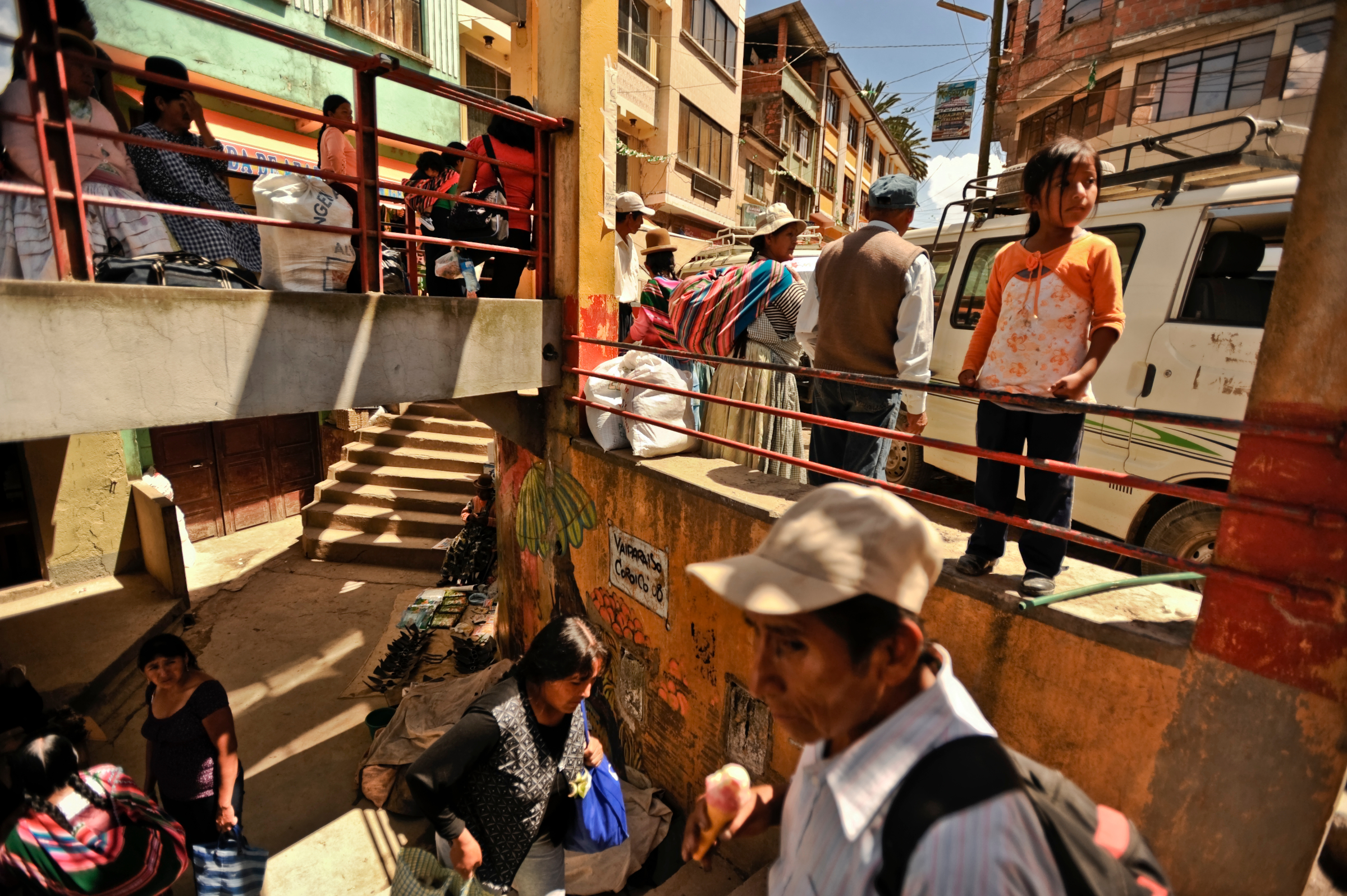
Market in Coroico, Yungas, where many young people sell coca leaves.
© Meridith Kohut / The New York Times
Across Latin America, the pendulum is swinging back and forth between the radical discourses and populist demands of the Bukeles and Mileis, the Ortegas and Morales. But no longer is the pendulum swinging between ideological extremes, between the nationalisation of private companies and radical liberalism. The back-and-forth now seems to serve the geopolitical interests of certain strategic allies, namely, the United States, China, Russia and the European Union. They support the special interests and the concentration of power in the hands of "messianic leaders" by misusing their political discourses for their own ends.
At work over the past two decades, these dynamics display several common denominators, namely, weak States, presidential systems, concentration of power in the hands of a few, co-opted and corrupt judicial systems, limited legitimacy of the party system and national parliaments, and foreign economic dependence. Bolivia is no outlier, being on the cusp of 20 years of populism (17 of which were dominated by the Left, and two by the Right), with all of the above hallmarks, plus a few other country-specific ones.
As in most countries in the region, the political parties lack legitimacy. The political elite seek out other channels such as churches, civil society organisations, or trade unions that represent the coca farmers (Bolivia's most important social movement, from which Evo Morales derives his political base). The latter are mobilised on the basis of clientelist interests. Bolivians are organising, complaining and protesting, but are not putting forward any meaningful proposals.
Bolivia also has a weak, overwhelmingly corrupt and illegitimate judicial system. Other government entities have limited capabilities, high staff turnover, excessive red tape, and produce dubious management outcomes. At the turn of the millennium, 25 per cent of the funds for public investment was in the hands of the central government, and 75 per cent in the hands of local governments; the latter figure is now down to 20 per cent. The centralisation of public decision-making and budgets is a clear indication of Bolivia's institutional shortcomings.
The long reach of Swiss development cooperation
Ventilators were in short supply during the pandemic, and poorer countries in particular were unable to access these life-saving machines. In Bolivia, for example, medical staff had to perform ventilations by hand. Driven by necessity, a Bolivian university developed an automatic ventilator that was inexpensive and could be quickly built. It was sold at cost to remote communities, and to other countries. This was only possible thanks to the support of Swiss development cooperation, which funded the work and forged ties between the various stakeholders.
Since the presidency of Evo Morales (2005 to 2019), Bolivia's poverty rate has fallen significantly: extreme poverty is down from 38 per cent to less than 15 per cent, and moderate poverty from 60 per cent to 39 per cent. There has been relative macroeconomic stability, with inflation in the single digits, and economic growth averaging almost 4 per cent.
Despite these promising figures, Bolivia's current economic situation gives little cause for optimism. The informal economy encompasses almost 80 per cent of the population. These people have no access to social security systems, they receive no employee benefits and are not taxed. Moreover, proven gas reserves – the country's principal source of income and exports – have diminished sharply, the public sector has become bloated, and the national budget can no longer sustain fuel subsidies.
The upshot has been years of budget deficits since 2014, and dwindling foreign exchange reserves. Both external and domestic public indebtedness has increased exponentially. Bolivians are now grappling with an extreme foreign currency shortage especially those engaged in imports. This has spawned a black market and is generating considerable devaluation and inflationary pressure.
Yet another factor is accelerated urban sprawl. Huge swathes of urban dwellers live in precarious circumstances in the big cities and towns, or migrate to agricultural areas during the planting and harvesting seasons. This expands the country's agricultural zones and puts pressure on the provision of basic services in urban and suburban areas.
In this context, the central government is pursuing an ambivalent environmental policy. Under the pretext of encouraging the settlement of large uninhabited areas, it is facilitating migration to the lowlands. This is helping to push back the agricultural frontiers and to increase the production of coca leaves – mostly for illegal use. At the same time, the government is resorting to slash-and-burn techniques to secure more land for cultivation. This is damaging both fauna and flora. Deforestation and forest fires are a constant feature in the Amazon and the Chiquitano dry forest. Besides, national climate protection commitments are far from being met.
In the meantime, the governing party (MAS – Movimiento al Socialismo) is disintegrating. The current President Luis Arce – former Minister for the Economy to Evo Morales – has secured the loyalty of a large share of party-affiliated organisations. Evo Morales, in turn, controls the most important pro-government figures in the Parliament and is the current party chairman and also the most important leader of the coca farmers. This power struggle has spawned divisions across all government agencies and slowed down the public administration. This situation is likely to persist until the elections in 2025.
In this problematic setting, opportunities are rare, but they do exist and should be seized. Urban concentration is a driver of innovation and entrepreneurship. The role of the private sector and of academia can be enhanced for the purposes of finding solidarity-based and participatory development solutions. The favourable age structure and its potential for boosting the workforce constitute a significant factor that is concentrated in medium-size cities and fast-growing conurbations. The ecological diversity, huge forests and mountains offer interesting opportunities.
Exploiting the opportunities will require efforts in the realms of natural resource management, inclusive economic development, sustainable urban development, or sewage and waste management. International cooperation must support these endeavours and provide technical assistance. Lastly, it is incumbent on citizens to demand that decisions and measures are implemented. This can help ensure that those who have emerged from poverty do not fall back into poverty.
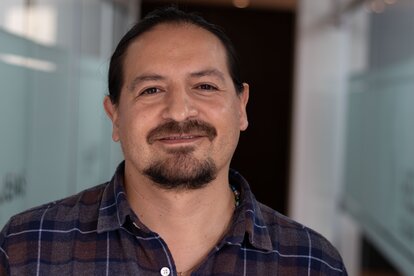
Martín del Castillo is an economist and political scientist and holds a Master's degree in public management and decentralisation from the Universidad Andina Simón Bolívar in Sucre, Bolivia, and a Master's degree in development from the University of Geneva. He has been working for Helvetas since 2007.
Share post now
Article
22.06.2020, International cooperation
For decades, the neoliberal development model has been accepting of the repression of human rights. It is time for a paradigm shift.

When completed the Grand Ethiopian Renaissance Dam (GERD) on the Blue Nile will be the largest hydropower plant in Africa.
© Pascal Maitre/Panos
Share post now
Article
05.10.2020, International cooperation
Patricia Danzi took over as head of the Swiss Agency for Development and Cooperation (SDC) on 1 May, succeeding an FDFA diplomat who had reached the end of his career. In an interview, she lays out some initial priorities.
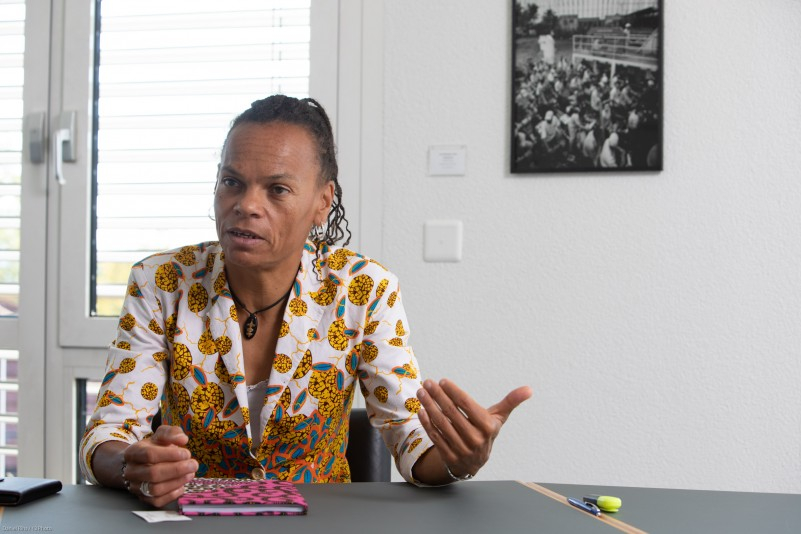
Patricia Danzi in the interview on September 8, 2020.
© Daniel Rihs / Alliance Sud
Share post now
Meinung
05.10.2020, International cooperation
In 2019, Alliance Sud reported in its magazine “global” on the Swiss agricultural firm GADCO in Ghana. Those in charge rejected the portrayal. Guest author Holy Kofi Ahiabu, the Ghanaian employee of Alliance Suds Kristina Lanz, faced intimidation.
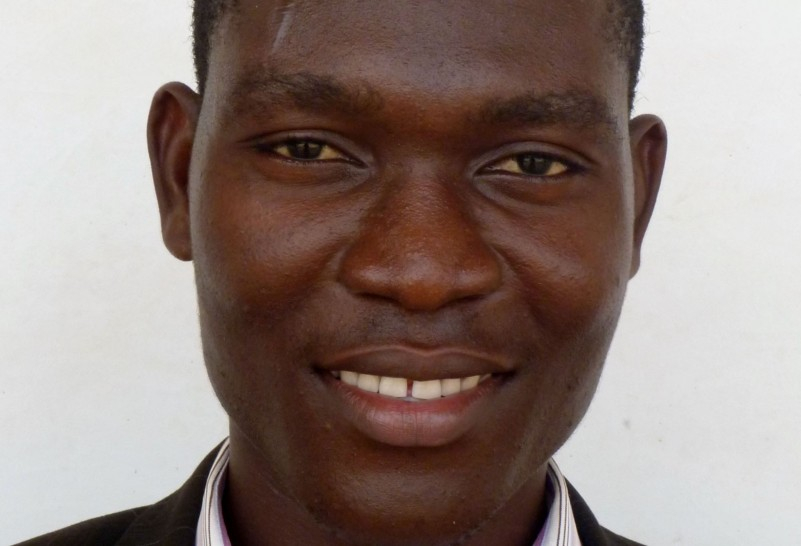
Holy Kofi Ahiabu
Share post now
Meinung
10.12.2020, International cooperation
The increase in gender-based violence during lockdowns, labelled the “shadow pandemic” by the UN, threatens the lives and livelihoods of women and girls in Nigeria. There is a need for collective action, writes Oladosu Adenike Titilope.
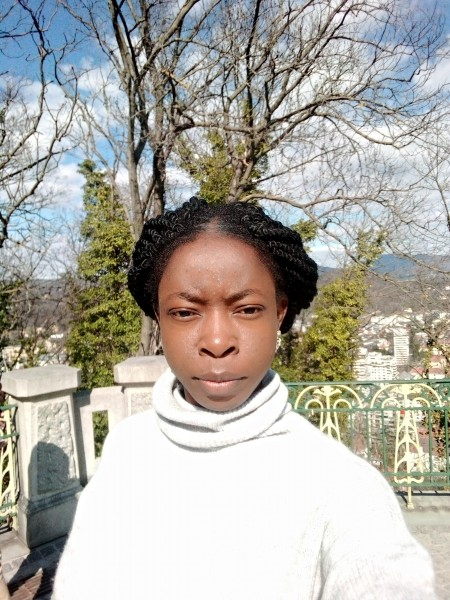
Share post now
Article, Global
22.03.2021, International cooperation, Financing for development
In implementing the International Cooperation Strategy 2021-2024, the SDC plans to scale up its cooperation with the private sector and strike up new partnerships. How is this impacting developing countries?
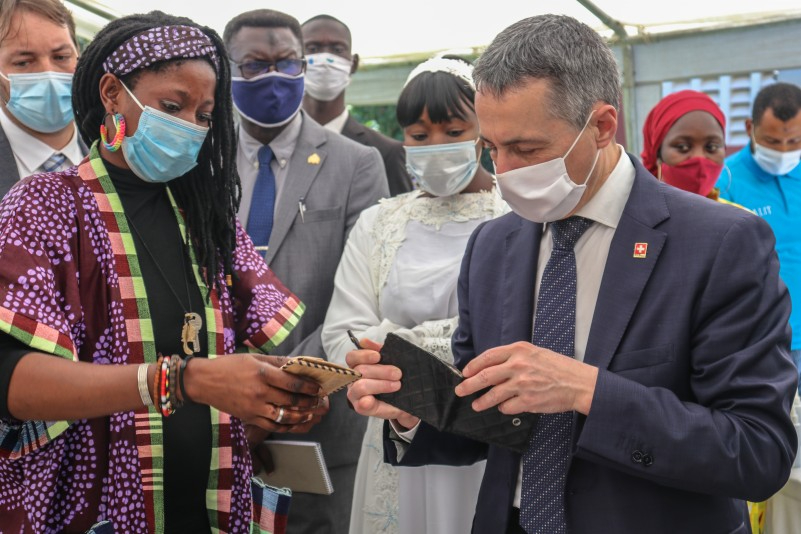
Foreign Minister Ignazio Cassis visits a tourism education institute during his trip to Africa in February 2021.
© Foto: YEP Gambia
Working with the private sector is nothing new in the framework of Switzerland’s international cooperation, whether in the activities of the State Secretariat for Economic Affairs (SECO) or the Swiss Agency for Development and Cooperation (SDC).[1] In accordance with Sustainable Development Goal No. 17 enshrined in the 2030 Agenda, that of entering into partnerships in pursuit of the Sustainable Development Goals (SDGs), Swiss international cooperation had already increased involvement with the private sector during the period 2017-2020.[2] So far, however, that cooperation had never been framed within an SDC strategy. This will now change, at least in part.
Published in January 2021, the “General Guidance on the Private Sector in the context of the International Cooperation Strategy 2021–24” lays out the basic principles governing SDC activities in connection with the private sector and outlines various forms of cooperation with private sector players, as well as the associated challenges and opportunities.
Considering that the private sector makes “the largest contribution to global poverty reduction and sustainable development” – especially as pertains to jobs, taxes and “innovative products that increase living standards in developing countries”[3] – the document states that the Federal Department of Foreign Affairs (FDFA) as well as the Federal Department of Economic Affairs, Education and Research (EAER) plan to step up cooperation with the private sector under the International Cooperation Strategy 2021-2024 and the Federal Council’s new 2030 Sustainable Development Strategy.
In this connection, the SDC points out that in addition to official development assistance (ODA) and domestic tax revenues, the 17 Sustainable Development Goals can only be achieved if “private sector investments are successfully mobilised.” The private sector is therefore considered by SDC as “part of the solution” for reaching the global development and climate protection goals.
For the SDC, private sector involvement in sustainable development is focused on the following four areas of activity: (1) Economic policy frameworks: this includes promoting the rule of law as well as responsible business conduct and sustainable investment. (2) Promotion of local companies in the priority countries for Swiss international cooperation, especially small and medium-sized enterprises (SMEs). (3) Private Sector Engagement (PSE): this entails engaging in partnerships with private sector players from Switzerland and other countries. And last but not least, (4) Public procurement. This area of activity encompasses SDC contracts awarded to private sector players (at home and abroad), which must meet more stringent sustainable development criteria in the future.
According to the SDC, the third area of activity, private sector engagement (PSE) encompasses ways in which Swiss international cooperation can engage with “established" private sector players that “consistently promote” sustainable development. The SDC states that such private sector players – in both the real economy and the financial sector – can contribute to poverty reduction and therefore make interesting partners for international cooperation. They include large companies and multinational enterprises, SMEs, social enterprises, impact investors and grant-making foundations. Each of these categories has its own “specific strengths”. In this connection, the SDC also mentions, for example, NGOs and academic institutions as possible implementation partners.
As stated in the “SDC Handbook on Private Sector Engagement”, the SDC plans, over the medium term, in other words during the implementation of the International Cooperation Strategy 2021-2024, to increase engagement with the private sector as well as the financial volume of its PSE portfolio. In addition to “traditional” PSE approaches, “new financial instruments” are to be developed, whereby the volume of public-private cooperation can be increased also in least developed countries (LDCs) and in fragile contexts.
Although the document mentions that the setting of a quantitative growth objective is not meaningful, it does note that currently some 8 per cent of all SDC-funded projects (bilateral activities and global programmes) entail partnerships with the private sector. Based on a combination of various factors, it is estimated that over the long run, some 20-25% of all SDC operations could be implemented in collaboration with the private sector, in both the bilateral and multilateral spheres. If we take as a baseline value the 2020 volume of spending of CHF 165 million for the roughly 125 existing partnerships, the volume could rise to almost half a billion in annual spending over the long term.
It should be recalled that the International Cooperation Strategy 2021-2024 makes no provision for the increase of the respective credit lines for the funding of these partnerships, but provides for them to be paid for with funds already earmarked for bilateral development cooperation.[4] This means that the increase in partnerships with the private sector will take place at the expense of other forms of cooperation that have been shown to hold implications for poverty alleviation, more particularly programmes in support of essential public services including education and health. It could also negatively impact other forms of private sector support in developing countries, including the promotion of local SMEs.
It is therefore necessary to ensure the developmental impacts of these partnerships and the relevance of the goals being pursued through this kind of cooperation with the private sector. On this point, the “General Guidance on the Private Sector” nevertheless remains vague, or as it stands, fails to convey any clear idea of how SDC plans to guarantee, under such partnerships, the effective fulfilment of its primary mandate, that of combating poverty in priority countries.
The SDC internal handbook lays out various criteria and modalities for cooperation as well as a complex risk analysis procedure. But as always, the devil is in the detail. The SDC will have to ensure that in creating the partnerships, these criteria and processes are effectively observed by all players and not merely ticked off on a list.
Given the clear trend among the Multilateral Development Banks (MDBs) and bilateral donors, the SDC could find itself under pressure to “boost” its PSE portfolio without being able to guarantee that these partnerships are consistent with the core objective of the 2030 Agenda, that of “leaving no one behind”.
[1] See external audit report 2005-2014 on the promotion of employment.
[2] See “Switzerland’s international cooperation is working. Final report on the implementation of the Dispatch 2017–20”, p. 7.
[3] This statement must be qualified in many respects. More on this later.
[4] “In the event that the SDC establishes new forms of cooperation with the private sector, a new budgetary credit line could be created and the requisite funding will be drawn from the ‘Development cooperation (bilateral)’ credit.” IC Strategy 2021-2024, p. 35.
Share post now

global
The Alliance Sud magazine analyses and comments on Switzerland's foreign and development policies. "global" is published four times a year (in german and french) and can be subscribed to free of charge.
Article, Global
03.10.2023, International cooperation
Fragile statehood is one of the biggest obstacles to effective and sustainable poverty alleviation. Alliance Sud has discussed the opportunities and limits of international cooperation in fragile contexts with Professor Christoph Zürcher.
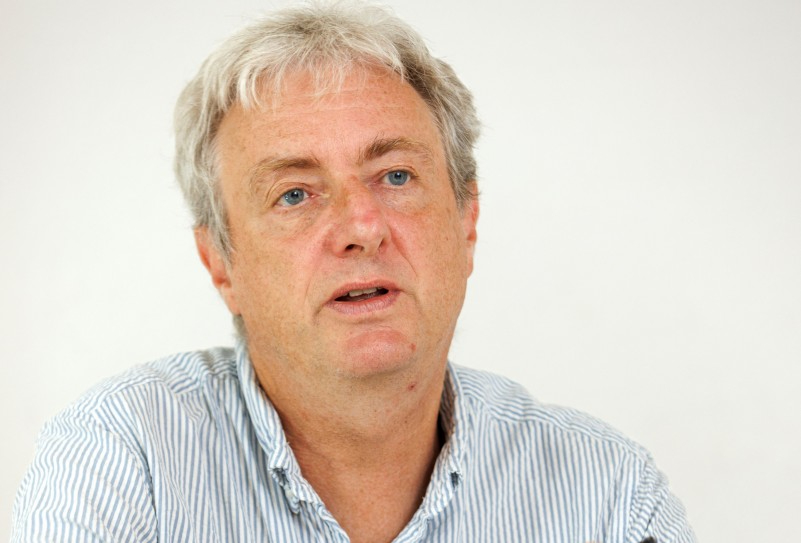
Christoph Zuercher is a professor at the Graduate School of Public and International Affairs at the University of Ottawa. As a political scientist, he conducts research and lectures on peacebuilding, international relations and international cooperation, with a regional focus on the former Soviet Union, especially Russia, the Caucasus and Central Asia. In his most recent work he focused mainly on assessing the impact of international cooperation in fragile contexts.
© Daniel Rihs
Share post now

global
The Alliance Sud magazine analyses and comments on Switzerland's foreign and development policies. "global" is published four times a year (in german and french) and can be subscribed to free of charge.
Opinion
02.10.2023,
The war in Darfur has destroyed his hometown of Nyala. But not the call for justice and peace, writes Sudanese journalist and human rights observer Ahmed Gouja.
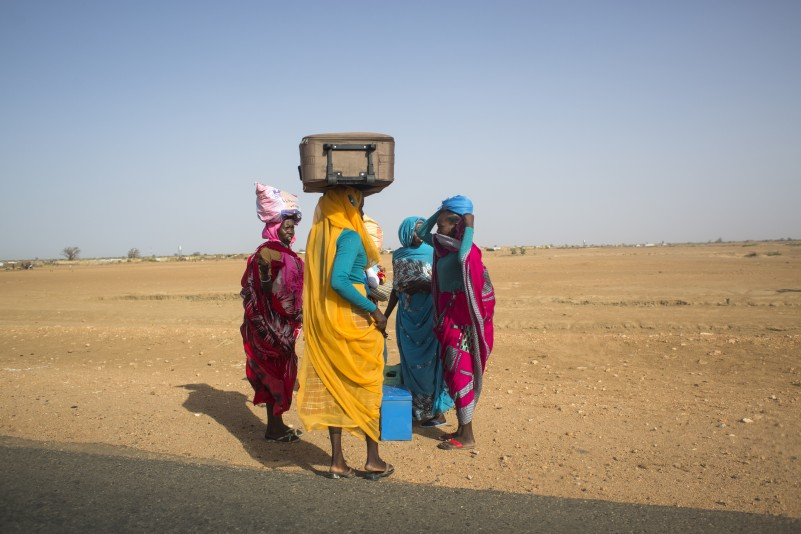
In 2021, many of the internally displaced people in Nyala began to resettle in neighbouring villages. But the bloody conflict in Sudan in recent months forced these women to flee again.
© Ala Kheir
Share post now
Opinion
03.10.2023, International cooperation
In fragile contexts, does only a strong army help? Solid research shows that development cooperation can play an important role even in an exceptionally difficult environment, writes Alliance Sud Director Andreas Missbach.
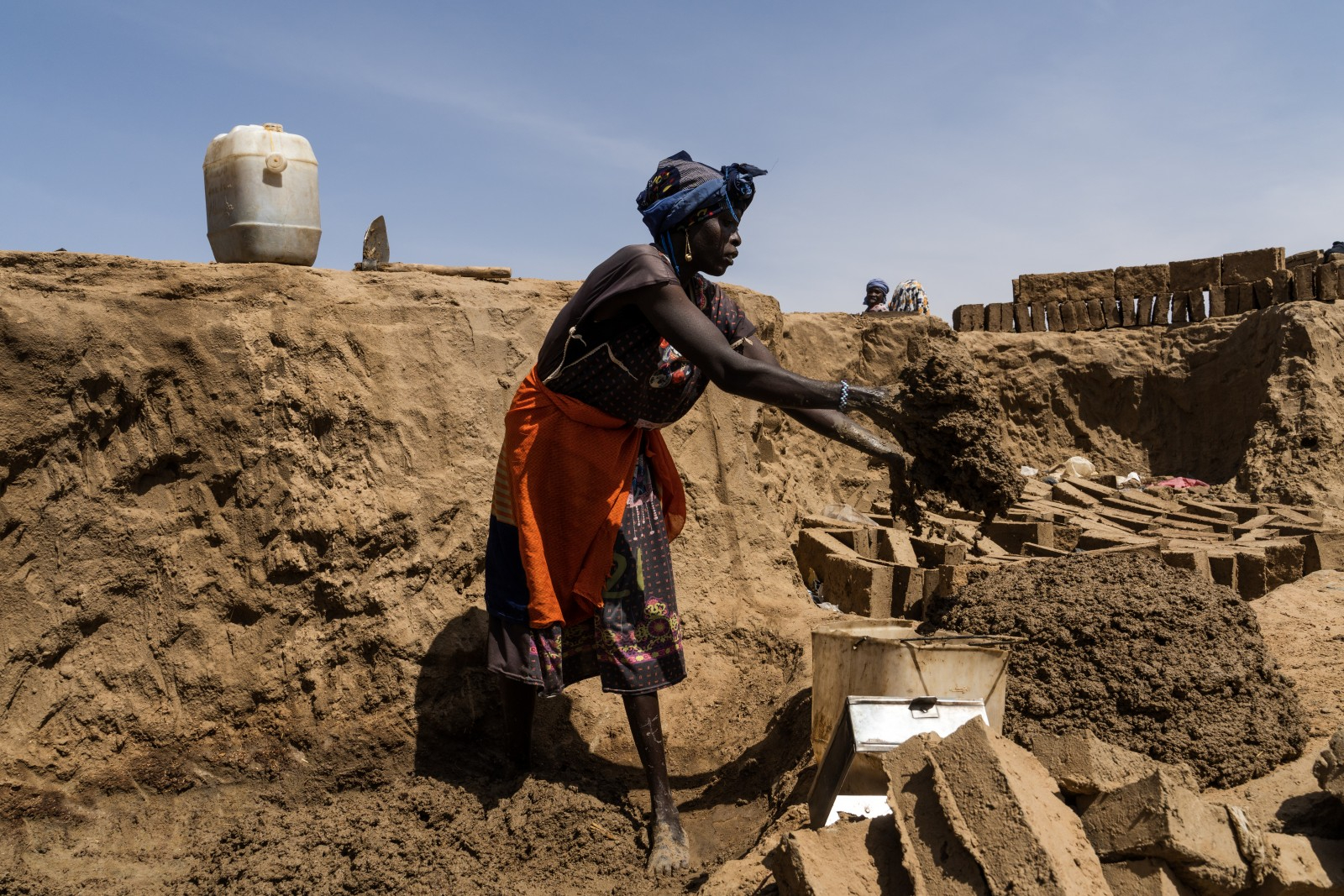
© Ala Kheir
Share post now